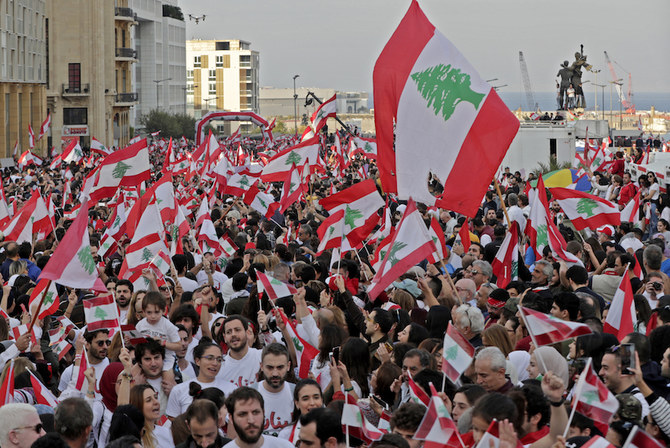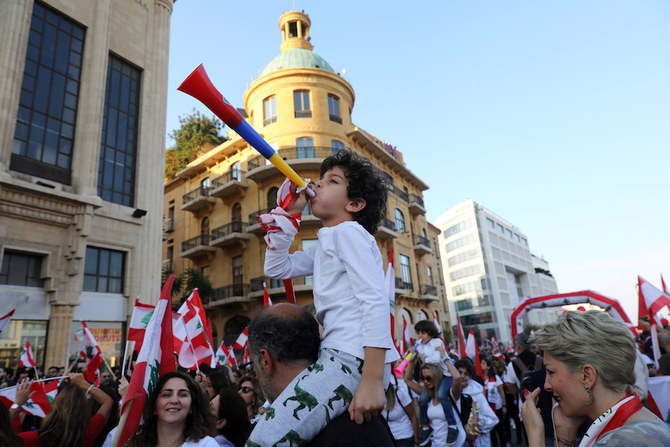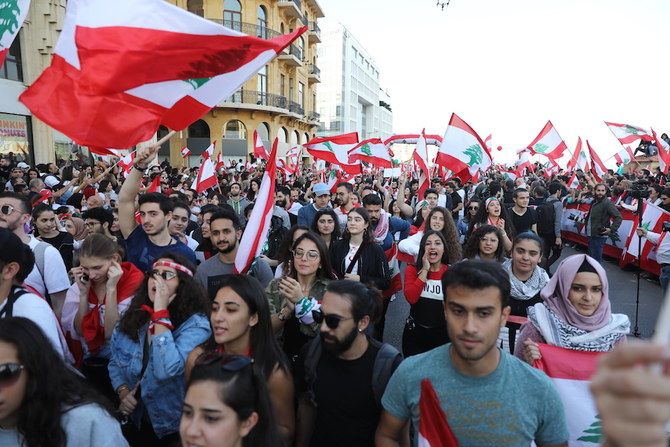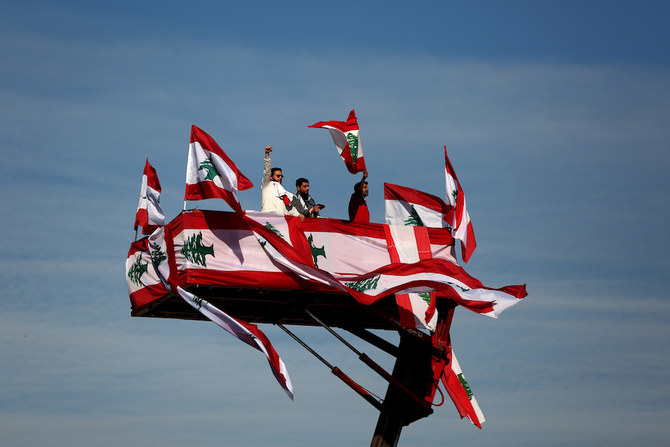BEIRUT: Protesters and Lebanon’s embattled politicians on Friday held separate celebrations to mark the country’s 76th Independence Day.
Lebanese leaders attended the traditional military parade, which was much truncated and had to be moved to the Ministry of Defense’s headquarters because demonstrators had occupied the usual venue in central Beirut.
Meanwhile, thousands of protesters staged a peaceful march through the capital’s Martyrs’ Square, 37 days after the start of national action against the political elite which has plunged the country into economic crisis and prompted the resignation of Prime Minister Saad Hariri.
The government’s national day parade was attended by President Michel Aoun, Parliament Speaker Nabih Berri, and caretaker premier Hariri, the first time the trio had appeared in public together in three weeks.
Fashion designer Paula Noaman was among Lebanese citizens taking part in the self-rule anniversary celebrations in Riad Al-Solh and Martyrs’ squares which she described as “a celebration of freedom.”
Her friend Deniz Nassif Sader, also a fashion designer, said: “The ruling class has become decrepit and must be renewed. If they consider Lebanon a company, then its owner must step down when he gets old. But our politicians have a big ego and are clinging to power like children.
“They can no longer run Lebanon the way they have been doing for decades. We need a young generation. Who said that young people have no experience in politics? Politics have destroyed us. Give the youth the chance to create a different Lebanon.”
Many activities accompanied the civil celebrations in town and city squares throughout Lebanon. A giant fist, symbolizing the civilian uprising in Lebanon, was set on fire to in Martyrs’ Square on Friday morning.
Youssef Issa, an activist, said: “Unidentified young men on motorcycles sneaked into the square at dawn, threw a Molotov cocktail at the cutout image of a large fist, and left. The security forces in the area could not catch them.”
The incident provoked social media reaction criticizing the “sabotage of the revolution.”
Another protester, Joyce Thabet, said: “Those cowards were intimidated by a hand that carries no weapon. A hand of cardboard. They are men of cardboard. The revolution will continue and will burn anyone who undermines people’s dignity.”
Former MP Faris Saeed stressed that “whoever burned the fist is foolish because every city and town in Lebanon will have a revolution symbol.”
Protesters were quick to replace the fist, with Independence Day participants using torches on their cell phones to light up the square.
Hisham Tabbara, 57, said: “Today’s message is that the revolution will continue until we are independent of corruption. My generation was the one that produced this wonder generation of young people who are aware of their rights and refuse to be a herd of sheep.”
Protesters from Baalbek-Hermel, considered an incubator environment for Hezbollah and the Amal Movement, also joined in celebration marches.
Ali Yazbeck said: “It is not true that all the people in our area are with Hezbollah and Amal. There is 40-50 percent who voted for them, but the rest refrained from voting because they believed that the candidates did not represent their aspirations. We want to build a homeland in which Hezbollah supporters are part of a non-corrupt country.”
Activists from Qabb Ilyas in the Bekaa area, which is known for its loyalty to the prime minister, also took part in national day events.
Zakaria Kouider, of the Bekaa Youth Movement, said: “The president’s speech, in which he addressed the people of Lebanon on the eve of Independence Day, did not address the concerns of the people. We do not care about oil. We want taxes to be canceled. We want old-age security and we want to live with dignity.
“I work in mechanics in a factory in the Bekaa, but others cannot work unless they pull strings. People in the Bekaa can no longer buy heating fuel, and the weather has become very cold. Heating in the Bekaa costs 800,000 liras ($520) — this is a month’s salary and it is barely enough.”
Amer Hassan Salloum, a 25-year-old maintenance worker in Zahle, said he joined the revolution because he wanted “to change the ruling class.”
He said he was not a Hariri supporter but added: “Without Hariri, the country cannot be run. He is a magnet that attracts the international community and gives confidence to the country. Also, he was the first to step down at the request of the people and he stood by the movement.
“It is true that President Aoun is addressing us calmly, but he complains about the corrupt, and we complain about them. Who is the corrupt? Help us understand.”
Young expatriates in Arab, European and American countries coordinated via social media and traveled to Beirut to spend the weekend in the squares.
Dalia Obeid, a public health researcher who has lived in Paris for 17 years, said: “We arrived at Beirut airport today and came to the square. Each of us paid their travel costs. We are active in setting up groups abroad to support the movement in Lebanon. We have come to Lebanon to say that we want to return to a country in which there is neither chaos nor corruption. We have come because we believe there is hope for our return through this revolution.”
As the day advanced, the number of protesters in Beirut’s squares soared and included intellectuals, doctors, pharmacists, environmentalists, artists, lawyers, teachers, mothers with children, people with special needs, bank employees, engineers, agriculturalists, craftsmen, businessmen, industrialists, and athletes. They all carried Lebanon’s flag and chanted for the revolution.
Caretaker Defense Minister Elias Bou Saab gave a speech following the symbolic military parade. He said: “There are people using the civic movement politically to come across as heroes — whether through negotiations to form a government or by seeking to improve the stance.
“How can anyone name all the ministers from outside the existing parliamentary blocs? How will they win trust? There are political, sectarian and religious balances.”
Bou Saab highlighted that parliamentary consultations are bound by their outcome and not by time.
Protesters in the street are demanding a speedy appointment for binding parliamentary consultations to appoint a prime minister. The president and his ally Hezbollah are holding onto a techno-political government, while Prime Minister Hariri wants a technocratic government if he is named to take over the new government.





















